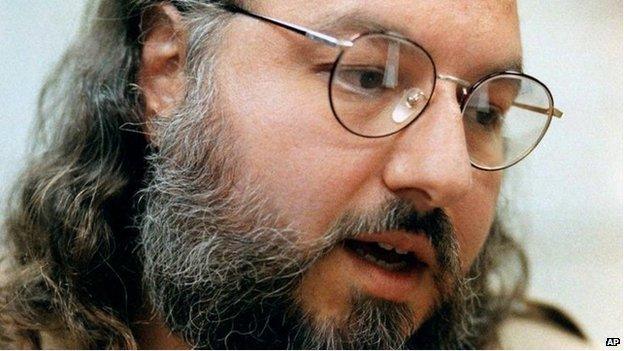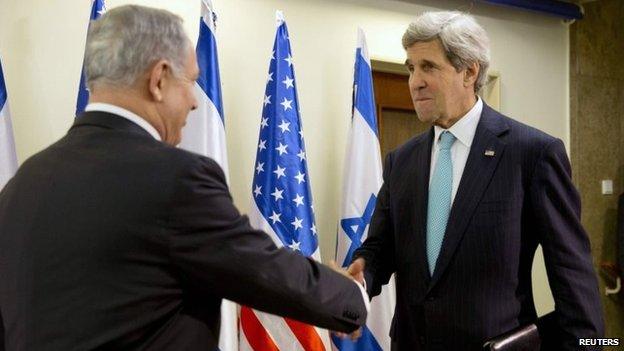US 'may free Israel spy Jonathan Pollard'
- Published

Jonathan Pollard was jailed for life in 1987 for passing thousands of classified documents to Israel
The US may consider releasing Jonathan Pollard, an American jailed for spying for Israel, in an bid to save the Middle East peace process, reports say.
A US official told the New York Times, external that no decisions had been made, but confirmed there had been discussions.
Israel would have to make significant concessions to the Palestinians in return, reports said.
Pollard, a former US Navy intelligence analyst, was jailed for life in 1987 for passing documents to Israel.
US Secretary of State John Kerry flew to the region on Monday for urgent talks.
He held two meetings with Israeli Prime Minister Benjamin Netanyahu, and had discussions with chief Palestinian negotiator Saeb Erekat, before flying out after only several hours. None of the sides have commented on the talks.
It is the second time that Mr Kerry has interrupted his schedule to press Israel and the Palestinians to extend the direct peace talks beyond 29 April - the deadline set last summer when they resumed after a three-year hiatus.
'On the table'
His plan has been derailed by a dispute over the release of a fourth batch of 26 long-term Palestinian prisoners from Israeli jails.
Mr Abbas had insisted that they be freed by 29 March, in keeping with a promise made by Israel before the direct negotiations resumed.
Israeli officials have said they are reluctant to proceed unless the Palestinians commit to extending the talks, and stressed that the releases have always been tied to their progress.
The previous three releases were deeply unpopular with the Israeli public because many of the prisoners were convicted of murdering Israelis.
The possible release of Pollard has reportedly emerged as an incentive for Israeli co-operation.
Like his predecessors, Mr Obama has refused to release the 59-year-old despite repeated pleas from Israeli leaders.
However, last year he told Israeli TV that he would make sure his sentence would be "accorded the same kinds of review" as every other American prisoner.
Officials familiar with the negotiations told the New York Times that Pollard's possible release was one element in discussions about a broader arrangement that had not yet been reached and that the president would need to approve.
Two people close to the talks told the Associated Press that in return for such a move, Israel would have to undertake significant concessions to the Palestinians.
Concessions could include some kind of construction freeze at Jewish settlements on occupied territory, the release of further batches of Palestinian prisoners, and a guarantee not to pull out of the talks.

Kerry's latest visit was unscheduled and at a time when the talks hang in the balance
White House spokesman Jay Carney declined to discuss any possible deal over Pollard.
"He is a person who is convicted of espionage and is serving his sentence. I don't have any updates on his situation," he told a news conference on Monday.
Israel's government has also not commented, but senior Israeli sources told the Maariv newspaper that the "Pollard issue is on the table".